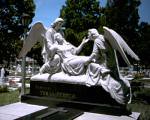April 5, 2005

He had been suffering from Parkinson’s disease for years and finally he deteriorated to the point his body determined his fate. Keeping true to his beliefs, he let himself go, believing that suffering was part of living and dying.
In the case of Terri Schiavo, that’s not what happened. Her body seemed perfectly willing to go on. She was not on a respirator as she could breathe for herself; her organs seemed to be working, except for her brain, which was functioning at a primitive level, keeping her alive. While most people in a persistent vegetative state die within a few years, she stayed on. There seemed to be--at least to the public--no real deterioration of her condition. Her body, in its wisdom, or indifference, kept going. Hence the furor. To pull the respirator from John Paul was to let him go. To take out the feeding tube from Terri Schiavo was to make her go. So when the pulled the plug, did they kill her? Yes. And no.
In the process of life and living, we tend to forget that each of us is the result of eons of evolutionary experimentation. That each one of us is alive is testimony to the body’s survival skills, developed in uncountable numbers of ancestors who face weather, hunger, pestilence, and the generally aggressive and selfish disposition of our own species. The result of the experiment is a body-mind unit--the person--a melding of flesh and psyche that has an innate inner balance, a wisdom of its own. Physicians study and are taught by the body’s recuperative wisdom. When someone is seriously ill or injured, the task of the health care team is to support the vital functions of the body--using the most advanced available technology--and coaxes the psyche to gather its strength to live while waiting for the body, in its wisdom, to heal itself.
Medical interventions do not heal the organs. Even if in the next decade or so scientists discover hormones or small proteins that will trigger the regeneration and repair of organ tissues, physicians will still be servants to the body’s own recuperative knowledge. The best a physician can do is control the environment so that the body can best heal itself.
So what happens when clearly the body can’t heal itself? Ever.
What they certainly ended when they took out the feeding tube, was the life of her body. But did they kill Terri Schiavo? Or did her heart failure, which cut off the blood to her brain for long enough to destroy her cortex, kill her? Did the heart failure simply do too incomplete a job, leaving it to the physicians in the hospice to finish it? We can get metaphysical here. What are humans? Where resides the soul?
Start with the premise that the doctors--all but the politically motivated doctors--were correct and she was no longer mentally alive. The brain stem was still operating but she thought no thoughts, felt no sensations, dreamed no dreams and was aware of nothing. The body moved, her eyes moved, but there was nobody inside. Now did they kill her?
It’s easy to come up with simplistic declarative statements, such as “it’s murder.” Fortunately--and unfortunately--life and death are not that simple and simplistic statements aren’t very useful.
Don’t let the wingnuts of the world obscure the argument. This is serious stuff.
No comments:
Post a Comment